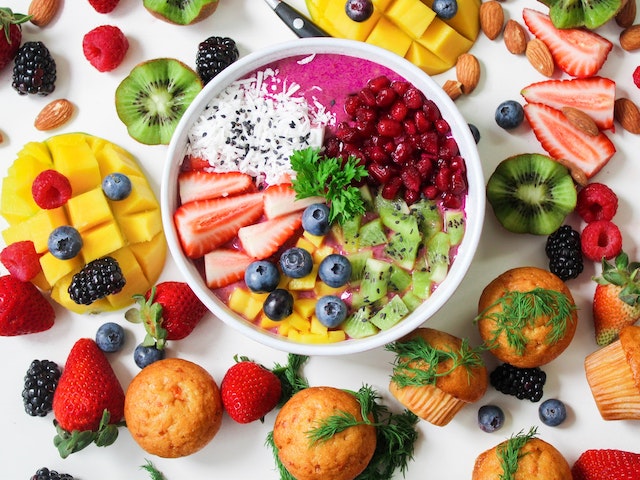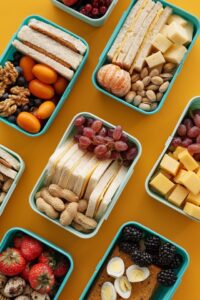Without enough protein, serious muscle growth cannot be achieved. Let’s talk about products containing protein, which your body will absorb almost in full.
How much protein is needed to repair and build muscle? An average of 0.8 grams of protein per kilogram of body weight. Throw in activity levels and the protein recommendations become more voluminous, although the degree of variation also depends on the type of physical performance. Recreational athletes should aim for doses of 1.1 to 1.4 g/kg, while bodybuilders often require higher intakes of 1.2 to 1.7 g/kg. However, some athletes may need 2.0 to 2.5 g/kg, depending on the duration and intensity of exercise.
Post-Workout Recovery Products
In addition to the amount of protein, quality should also be considered. Complete proteins, containing all the essential amino acids, are often recommended for the best stimulation of protein synthesis. But protein must also be supplemented with a healthy source of carbohydrates to replenish glycogen stores and stabilize blood sugar levels as muscles absorb available energy during and after exercise.
Are protein shakes necessary?
And when it comes to protein shakes, most health experts agree they’re not necessary. While they are convenient and contain valuable protein and nutrients, they can also contain unwanted ingredients, lack fiber, and hit the wallet hard.
Important: It is best to eat protein-rich foods within one to two hours after exercise, with protein evenly distributed between meals throughout the day.
CHAMPION FOODS – THE 7 BEST FOODS
FOR MUSCLE RECOVERY
Animal proteins
- Chicken is a go-to muscle building food for an obvious reason: about 100 grams of skinless chicken contains a whopping 28 grams of protein! If the chicken seems monotonous during prolonged use, culinary recipes will come to the rescue. From tandoori chicken masala to jerky chicken with mango salsa, the taste of this product is constantly changing.
- 100 grams of tuna contains 22 grams of protein! And if you want the convenience of protein shakes, canned or individually sealed tuna might be the way to go. Combine tuna with fresh cut vegetables or whole grain crackers for a balanced meal for muscle recovery. The high content of omega-3 fatty acids in this product will protect the body from inflammation after a strenuous workout.
- Regular cow’s milk is a healthy, balanced muscle food, as its natural carbohydrate content provides glycogen replenishment, and 8 grams of protein (per cup) promotes full muscle recovery. In addition, milk contains both whey (fast-acting) and casein (short-acting) proteins, both of which are beneficial for muscle synthesis. If your goal is fast protein absorption, use whey protein as an effective muscle recovery supplement.
- Athletes have been ingesting raw egg whites for centuries to get a quick protein boost. However, this can be harmful as proteins can interfere with the absorption of biotin and increase the risk of foodborne illness. But when thoroughly fried, protein can be a valuable muscle-building staple, as one medium-sized egg contains 6 grams of protein. Enjoy hard boiled eggs or scrambled eggs!
vegetable proteins
- Offering both protein (9 grams) and carbohydrates (7 grams) per half cup, edamame is great for muscle recovery. It is also an important plant-based source of protein for people who do not consume animal products as a matter of principle.
- A serving of almonds (about 23 nuts) contains 6 grams of protein. Just like tuna and other oily fish, almonds also contain omega-3 fatty acids, which have anti-inflammatory properties.
- Although peanut butter is not recommended due to its high calorie and fat content, it is a convenient plant-based protein source (providing 8 grams of protein per serving or two).
As you can see, even athletes who monitor their own muscle mass can do without protein shakes.
HIGH PDCAAS FOODS FOR MUSCLE GROWTH
Without a sufficient amount of protein, which is the building material for cells, serious muscle growth cannot be achieved. Let’s talk about products containing a protein that your body will absorb almost in full. There is a special indicator – PDCAAS or amino acid coefficient of protein absorption. It shows how the composition of the product meets human needs. The highest (and best) value for this indicator is 1.0.
List of high PDCAAS foods that increase the rate of muscle building:
- Milk. Milk increases protein synthesis in muscles and promotes tissue repair. Whole milk contains more essential amino acids than skim milk.
PDCAAS: 1.0; 60 kcal and 3.2 g of protein per 100 g. - Cottage cheese. Curd protein is digested slowly and amino acid levels remain elevated for 6-8 hours. Cottage cheese is appropriate to use before a long break in eating (at night).
– PDCAAS: 1.0; 70-160 kcal and 16.7 g of protein per 100 g. - Eggs. The leucine contained in eggs stimulates the synthesis of skeletal muscles. Do not abuse eggs due to their high cholesterol content.
– PDCAAS: 1.0; 74 kcal and 12 g of protein per 100 g. - Beef. Beef is effective for increasing muscle mass without fat. It contains amino acids in the same proportions as in human muscles.
– PDCAAS: 0.92; 158 kcal and 25 g of protein per 100 g. - Chickpeas. Chickpeas contain vegetable protein, fiber, vitamins and minerals. It is perfect for vegetarians to fill the lack of protein.
– PDCAAS: 0.78; 364 kcal and 9 g of protein per 100 g. - Fish. In addition to protein, fish contains healthy fatty acids.
– PDCAAS: 0.78; 100 kcal and 18-22 g of protein per 100 g. - Chicken breast . Chicken breast is high in protein and low in fat.
– PDCAAS: 0.92; 165 kcal and 31 g of protein per 100 g.


